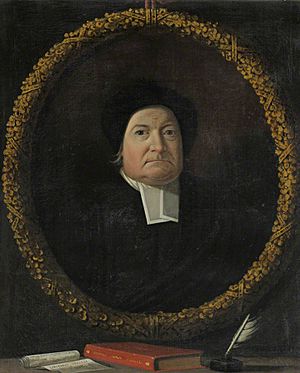Francis Blackburne (priest) facts for kids
Francis Blackburne (born June 9, 1705 – died August 7, 1787) was an English church leader. He was an Anglican clergyman, which means he was a minister in the Church of England. He also held an important church position called archdeacon of Cleveland. Blackburne was known for speaking out against a rule that required church ministers to agree to a specific set of beliefs called the Thirty Nine Articles.
Life of Francis Blackburne
Blackburne was born in Richmond, Yorkshire, England, on June 9, 1705. He went to school at Kendal, Hawkshead, and Sedbergh School. In May 1722, he started studying at Catherine Hall, Cambridge University.
Blackburne followed the ideas of John Locke, a famous thinker. Because of his beliefs, he was not given a special teaching job at his college. He became a deacon in the church on March 17, 1728.
After leaving college, Blackburne lived with his uncle in Yorkshire until 1739. That year, he became a priest and took over the rectory of Richmond in Yorkshire. He stayed there for the rest of his life. In 1750, he was given the title of Archdeacon of Cleveland. He also became a prebend of Bilton.
Blackburne's strong beliefs stopped him from getting more promotions in the church. He decided he would never again sign the Thirty Nine Articles. These were a set of statements about the Church of England's beliefs. He felt that ministers should not have to agree to them.
In 1772, a meeting was held in London to support Blackburne's ideas. About 200 people signed a petition based on his book, The Confessional. However, the petition was rejected after a speech by Edmund Burke, a famous politician.
Two people close to Blackburne, Theophilus Lindsey and John Disney, were also involved in this movement. Lindsey married Blackburne's stepdaughter, and Disney married his eldest daughter. Both Lindsey and Disney later left the Church of England to become Unitarians. Unitarians have different beliefs about God and Jesus than the main Church of England. Blackburne was thought to agree with some of their views.
In 1787, Blackburne performed his thirty-eighth church visit in Cleveland. He died a few weeks later, on August 7, 1787.
Works and Ideas
Francis Blackburne wrote several books and papers about his ideas on religion and the church.
In 1749, a book called Free and Candid Disquisitions relating to the Church of England was published. It suggested changes to church services. Blackburne supported this book.
He also wrote a paper in 1755 called No Proof in the Scriptures of an Intermediate State. In this, he supported the idea that the soul might "sleep" between death and judgment.
Blackburne's most important work was The Confessional. He wrote it to question the need for churches to make ministers sign statements of faith. He believed that the Bible should be the only guide for Protestants. He argued that ministers should only promise to teach from the Bible. The book was published anonymously in 1766. It caused a lot of debate and discussion.
Later, when his son-in-law John Disney left the Church of England, Blackburne wrote a paper called An Answer to the Question, Why are you not a Socinian? In this, he explained his belief in the divinity of Christ, even though he had some doubts.
Blackburne also worked on a life story of Martin Luther, a key figure in the Protestant Reformation. However, he stopped that project to write about his friend Thomas Hollis. These memoirs were published in 1780.
After his death, Blackburne's son Francis published his collected Works in 1804. These seven volumes included many of his writings, such as The Confessional and A Historical View of the Controversy concerning an Intermediate State. His writings showed that he did not support full religious freedom for Catholics at that time.
Family Life
In 1744, Francis Blackburne married Hannah Hotham. She was a widow who had been married before. Hannah died on August 20, 1799.
Francis and Hannah Blackburne had four children who lived:
- Jane, who married John Disney.
- Francis, who became a vicar (a type of priest) in Brignall.
- Sarah, who married the Reverend John Hall.
- William, who became a doctor in London.
Another son, Thomas, who was also a doctor, died at the age of thirty-three in 1782.
 | Dorothy Vaughan |
 | Charles Henry Turner |
 | Hildrus Poindexter |
 | Henry Cecil McBay |


